Applying Ethical Theory: EU Open Internet Regulation Analysis
VerifiedAdded on 2021/04/24
|6
|2437
|113
Report
AI Summary
This report analyzes the EU Open Internet Regulation, focusing on ethical considerations through the lenses of Utilitarianism, Deontology, Virtue Theory, and Contract Theory. The report begins by defining the regulation, which ensures net neutrality and equal access to lawful content. It then examines how each ethical theory applies, assessing the outcomes and justifications of the regulation. Utilitarianism is explored through the positive effects on European citizens and specialized services. Deontology evaluates the regulation's adherence to legal frameworks, including Regulations (EU) No 182/2011 and (EU) No 531/2012. Virtue Theory considers the moral character of internet users, and Contract Theory examines societal agreement. The conclusion affirms the regulation's ethical justification, highlighting its consideration of all stakeholders and adherence to legal content sharing, while also acknowledging the importance of lawful content. The report provides a detailed analysis of the EU Open Internet Regulation and its ethical implications.
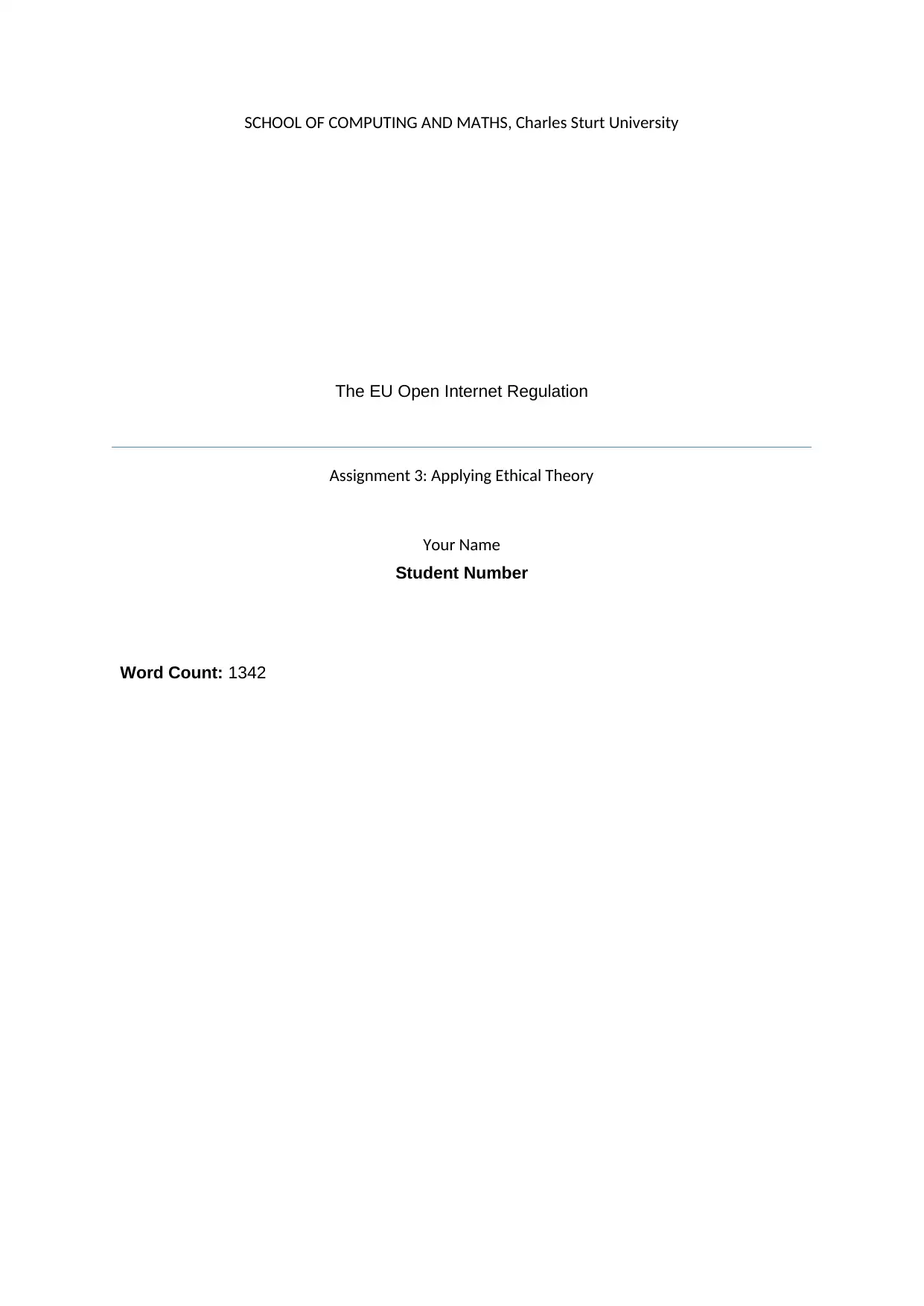
SCHOOL OF COMPUTING AND MATHS, Charles Sturt University
The EU Open Internet Regulation
Assignment 3: Applying Ethical Theory
Your Name
Student Number
Word Count: 1342
The EU Open Internet Regulation
Assignment 3: Applying Ethical Theory
Your Name
Student Number
Word Count: 1342
Paraphrase This Document
Need a fresh take? Get an instant paraphrase of this document with our AI Paraphraser
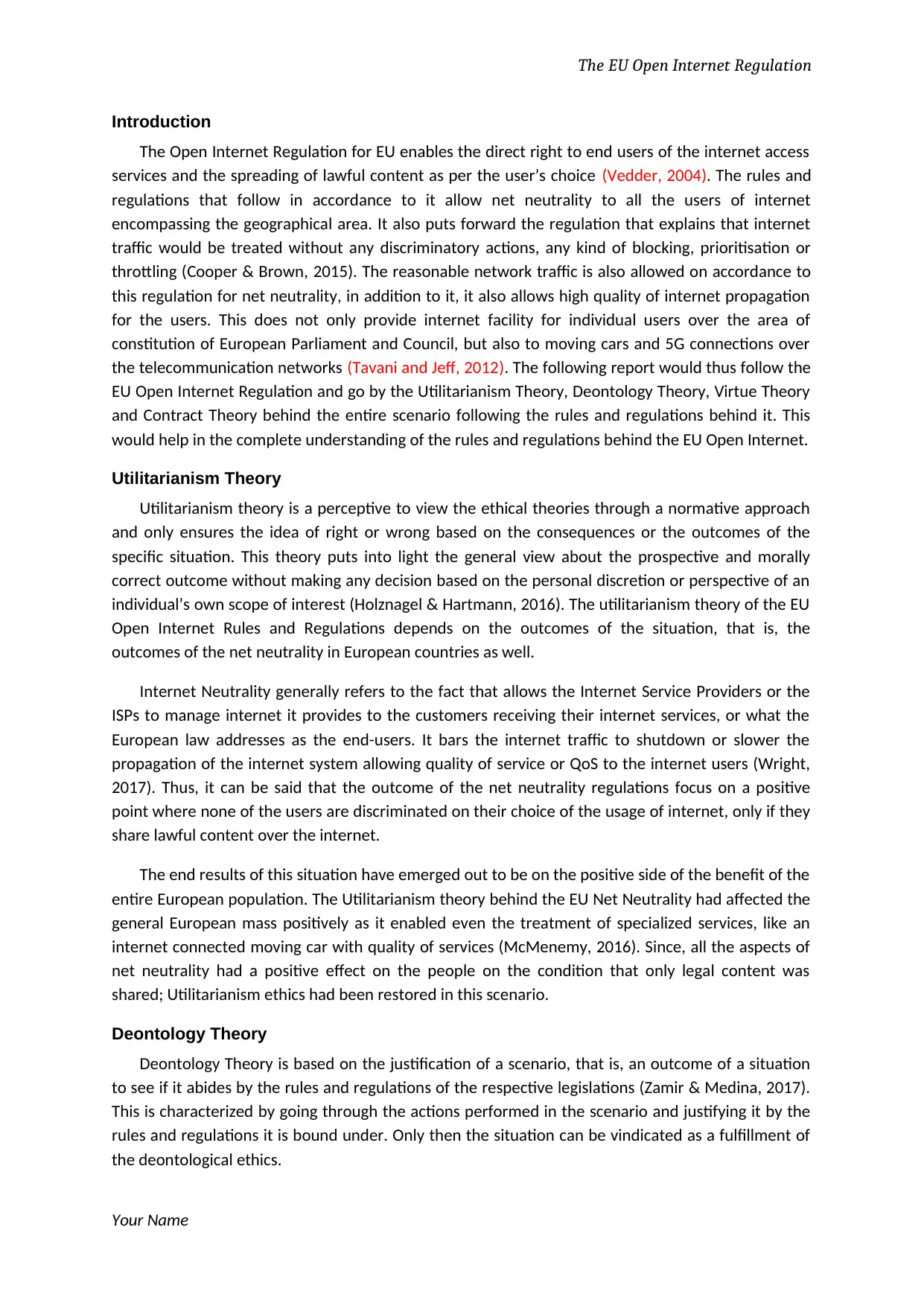
The EU Open Internet Regulation
Introduction
The Open Internet Regulation for EU enables the direct right to end users of the internet access
services and the spreading of lawful content as per the user’s choice (Vedder, 2004). The rules and
regulations that follow in accordance to it allow net neutrality to all the users of internet
encompassing the geographical area. It also puts forward the regulation that explains that internet
traffic would be treated without any discriminatory actions, any kind of blocking, prioritisation or
throttling (Cooper & Brown, 2015). The reasonable network traffic is also allowed on accordance to
this regulation for net neutrality, in addition to it, it also allows high quality of internet propagation
for the users. This does not only provide internet facility for individual users over the area of
constitution of European Parliament and Council, but also to moving cars and 5G connections over
the telecommunication networks (Tavani and Jeff, 2012). The following report would thus follow the
EU Open Internet Regulation and go by the Utilitarianism Theory, Deontology Theory, Virtue Theory
and Contract Theory behind the entire scenario following the rules and regulations behind it. This
would help in the complete understanding of the rules and regulations behind the EU Open Internet.
Utilitarianism Theory
Utilitarianism theory is a perceptive to view the ethical theories through a normative approach
and only ensures the idea of right or wrong based on the consequences or the outcomes of the
specific situation. This theory puts into light the general view about the prospective and morally
correct outcome without making any decision based on the personal discretion or perspective of an
individual’s own scope of interest (Holznagel & Hartmann, 2016). The utilitarianism theory of the EU
Open Internet Rules and Regulations depends on the outcomes of the situation, that is, the
outcomes of the net neutrality in European countries as well.
Internet Neutrality generally refers to the fact that allows the Internet Service Providers or the
ISPs to manage internet it provides to the customers receiving their internet services, or what the
European law addresses as the end-users. It bars the internet traffic to shutdown or slower the
propagation of the internet system allowing quality of service or QoS to the internet users (Wright,
2017). Thus, it can be said that the outcome of the net neutrality regulations focus on a positive
point where none of the users are discriminated on their choice of the usage of internet, only if they
share lawful content over the internet.
The end results of this situation have emerged out to be on the positive side of the benefit of the
entire European population. The Utilitarianism theory behind the EU Net Neutrality had affected the
general European mass positively as it enabled even the treatment of specialized services, like an
internet connected moving car with quality of services (McMenemy, 2016). Since, all the aspects of
net neutrality had a positive effect on the people on the condition that only legal content was
shared; Utilitarianism ethics had been restored in this scenario.
Deontology Theory
Deontology Theory is based on the justification of a scenario, that is, an outcome of a situation
to see if it abides by the rules and regulations of the respective legislations (Zamir & Medina, 2017).
This is characterized by going through the actions performed in the scenario and justifying it by the
rules and regulations it is bound under. Only then the situation can be vindicated as a fulfillment of
the deontological ethics.
Your Name
Introduction
The Open Internet Regulation for EU enables the direct right to end users of the internet access
services and the spreading of lawful content as per the user’s choice (Vedder, 2004). The rules and
regulations that follow in accordance to it allow net neutrality to all the users of internet
encompassing the geographical area. It also puts forward the regulation that explains that internet
traffic would be treated without any discriminatory actions, any kind of blocking, prioritisation or
throttling (Cooper & Brown, 2015). The reasonable network traffic is also allowed on accordance to
this regulation for net neutrality, in addition to it, it also allows high quality of internet propagation
for the users. This does not only provide internet facility for individual users over the area of
constitution of European Parliament and Council, but also to moving cars and 5G connections over
the telecommunication networks (Tavani and Jeff, 2012). The following report would thus follow the
EU Open Internet Regulation and go by the Utilitarianism Theory, Deontology Theory, Virtue Theory
and Contract Theory behind the entire scenario following the rules and regulations behind it. This
would help in the complete understanding of the rules and regulations behind the EU Open Internet.
Utilitarianism Theory
Utilitarianism theory is a perceptive to view the ethical theories through a normative approach
and only ensures the idea of right or wrong based on the consequences or the outcomes of the
specific situation. This theory puts into light the general view about the prospective and morally
correct outcome without making any decision based on the personal discretion or perspective of an
individual’s own scope of interest (Holznagel & Hartmann, 2016). The utilitarianism theory of the EU
Open Internet Rules and Regulations depends on the outcomes of the situation, that is, the
outcomes of the net neutrality in European countries as well.
Internet Neutrality generally refers to the fact that allows the Internet Service Providers or the
ISPs to manage internet it provides to the customers receiving their internet services, or what the
European law addresses as the end-users. It bars the internet traffic to shutdown or slower the
propagation of the internet system allowing quality of service or QoS to the internet users (Wright,
2017). Thus, it can be said that the outcome of the net neutrality regulations focus on a positive
point where none of the users are discriminated on their choice of the usage of internet, only if they
share lawful content over the internet.
The end results of this situation have emerged out to be on the positive side of the benefit of the
entire European population. The Utilitarianism theory behind the EU Net Neutrality had affected the
general European mass positively as it enabled even the treatment of specialized services, like an
internet connected moving car with quality of services (McMenemy, 2016). Since, all the aspects of
net neutrality had a positive effect on the people on the condition that only legal content was
shared; Utilitarianism ethics had been restored in this scenario.
Deontology Theory
Deontology Theory is based on the justification of a scenario, that is, an outcome of a situation
to see if it abides by the rules and regulations of the respective legislations (Zamir & Medina, 2017).
This is characterized by going through the actions performed in the scenario and justifying it by the
rules and regulations it is bound under. Only then the situation can be vindicated as a fulfillment of
the deontological ethics.
Your Name
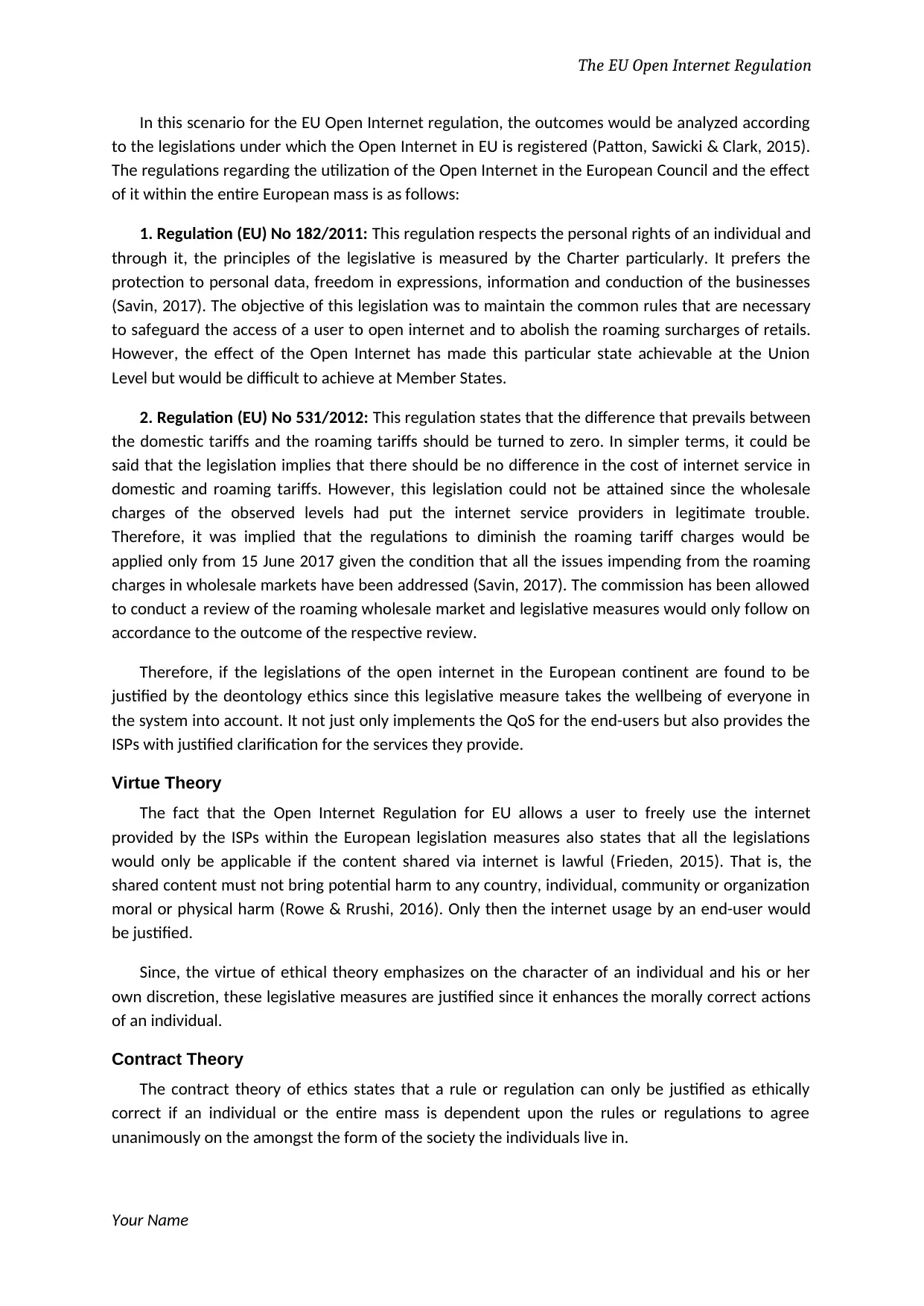
The EU Open Internet Regulation
In this scenario for the EU Open Internet regulation, the outcomes would be analyzed according
to the legislations under which the Open Internet in EU is registered (Patton, Sawicki & Clark, 2015).
The regulations regarding the utilization of the Open Internet in the European Council and the effect
of it within the entire European mass is as follows:
1. Regulation (EU) No 182/2011: This regulation respects the personal rights of an individual and
through it, the principles of the legislative is measured by the Charter particularly. It prefers the
protection to personal data, freedom in expressions, information and conduction of the businesses
(Savin, 2017). The objective of this legislation was to maintain the common rules that are necessary
to safeguard the access of a user to open internet and to abolish the roaming surcharges of retails.
However, the effect of the Open Internet has made this particular state achievable at the Union
Level but would be difficult to achieve at Member States.
2. Regulation (EU) No 531/2012: This regulation states that the difference that prevails between
the domestic tariffs and the roaming tariffs should be turned to zero. In simpler terms, it could be
said that the legislation implies that there should be no difference in the cost of internet service in
domestic and roaming tariffs. However, this legislation could not be attained since the wholesale
charges of the observed levels had put the internet service providers in legitimate trouble.
Therefore, it was implied that the regulations to diminish the roaming tariff charges would be
applied only from 15 June 2017 given the condition that all the issues impending from the roaming
charges in wholesale markets have been addressed (Savin, 2017). The commission has been allowed
to conduct a review of the roaming wholesale market and legislative measures would only follow on
accordance to the outcome of the respective review.
Therefore, if the legislations of the open internet in the European continent are found to be
justified by the deontology ethics since this legislative measure takes the wellbeing of everyone in
the system into account. It not just only implements the QoS for the end-users but also provides the
ISPs with justified clarification for the services they provide.
Virtue Theory
The fact that the Open Internet Regulation for EU allows a user to freely use the internet
provided by the ISPs within the European legislation measures also states that all the legislations
would only be applicable if the content shared via internet is lawful (Frieden, 2015). That is, the
shared content must not bring potential harm to any country, individual, community or organization
moral or physical harm (Rowe & Rrushi, 2016). Only then the internet usage by an end-user would
be justified.
Since, the virtue of ethical theory emphasizes on the character of an individual and his or her
own discretion, these legislative measures are justified since it enhances the morally correct actions
of an individual.
Contract Theory
The contract theory of ethics states that a rule or regulation can only be justified as ethically
correct if an individual or the entire mass is dependent upon the rules or regulations to agree
unanimously on the amongst the form of the society the individuals live in.
Your Name
In this scenario for the EU Open Internet regulation, the outcomes would be analyzed according
to the legislations under which the Open Internet in EU is registered (Patton, Sawicki & Clark, 2015).
The regulations regarding the utilization of the Open Internet in the European Council and the effect
of it within the entire European mass is as follows:
1. Regulation (EU) No 182/2011: This regulation respects the personal rights of an individual and
through it, the principles of the legislative is measured by the Charter particularly. It prefers the
protection to personal data, freedom in expressions, information and conduction of the businesses
(Savin, 2017). The objective of this legislation was to maintain the common rules that are necessary
to safeguard the access of a user to open internet and to abolish the roaming surcharges of retails.
However, the effect of the Open Internet has made this particular state achievable at the Union
Level but would be difficult to achieve at Member States.
2. Regulation (EU) No 531/2012: This regulation states that the difference that prevails between
the domestic tariffs and the roaming tariffs should be turned to zero. In simpler terms, it could be
said that the legislation implies that there should be no difference in the cost of internet service in
domestic and roaming tariffs. However, this legislation could not be attained since the wholesale
charges of the observed levels had put the internet service providers in legitimate trouble.
Therefore, it was implied that the regulations to diminish the roaming tariff charges would be
applied only from 15 June 2017 given the condition that all the issues impending from the roaming
charges in wholesale markets have been addressed (Savin, 2017). The commission has been allowed
to conduct a review of the roaming wholesale market and legislative measures would only follow on
accordance to the outcome of the respective review.
Therefore, if the legislations of the open internet in the European continent are found to be
justified by the deontology ethics since this legislative measure takes the wellbeing of everyone in
the system into account. It not just only implements the QoS for the end-users but also provides the
ISPs with justified clarification for the services they provide.
Virtue Theory
The fact that the Open Internet Regulation for EU allows a user to freely use the internet
provided by the ISPs within the European legislation measures also states that all the legislations
would only be applicable if the content shared via internet is lawful (Frieden, 2015). That is, the
shared content must not bring potential harm to any country, individual, community or organization
moral or physical harm (Rowe & Rrushi, 2016). Only then the internet usage by an end-user would
be justified.
Since, the virtue of ethical theory emphasizes on the character of an individual and his or her
own discretion, these legislative measures are justified since it enhances the morally correct actions
of an individual.
Contract Theory
The contract theory of ethics states that a rule or regulation can only be justified as ethically
correct if an individual or the entire mass is dependent upon the rules or regulations to agree
unanimously on the amongst the form of the society the individuals live in.
Your Name
⊘ This is a preview!⊘
Do you want full access?
Subscribe today to unlock all pages.

Trusted by 1+ million students worldwide
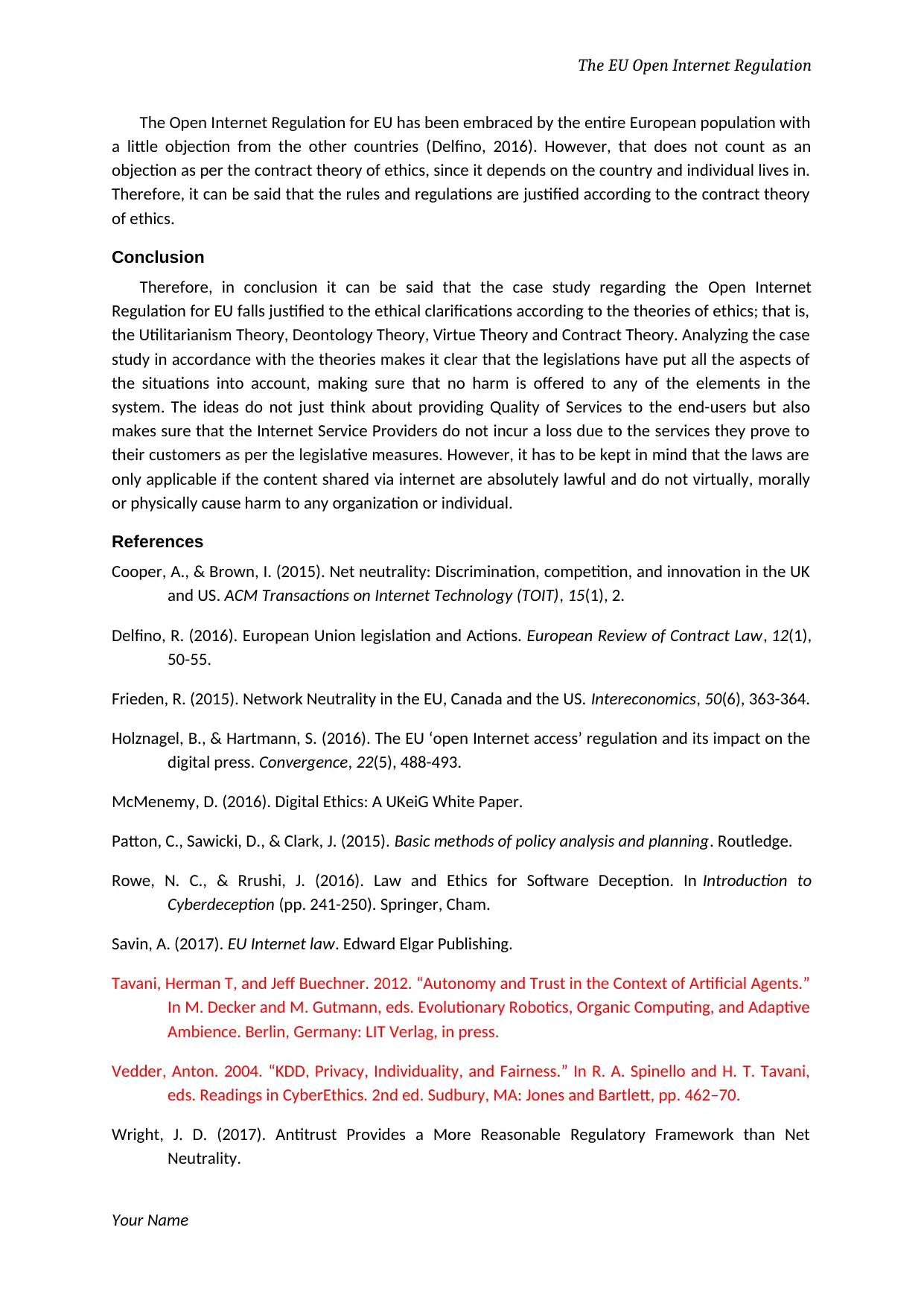
The EU Open Internet Regulation
The Open Internet Regulation for EU has been embraced by the entire European population with
a little objection from the other countries (Delfino, 2016). However, that does not count as an
objection as per the contract theory of ethics, since it depends on the country and individual lives in.
Therefore, it can be said that the rules and regulations are justified according to the contract theory
of ethics.
Conclusion
Therefore, in conclusion it can be said that the case study regarding the Open Internet
Regulation for EU falls justified to the ethical clarifications according to the theories of ethics; that is,
the Utilitarianism Theory, Deontology Theory, Virtue Theory and Contract Theory. Analyzing the case
study in accordance with the theories makes it clear that the legislations have put all the aspects of
the situations into account, making sure that no harm is offered to any of the elements in the
system. The ideas do not just think about providing Quality of Services to the end-users but also
makes sure that the Internet Service Providers do not incur a loss due to the services they prove to
their customers as per the legislative measures. However, it has to be kept in mind that the laws are
only applicable if the content shared via internet are absolutely lawful and do not virtually, morally
or physically cause harm to any organization or individual.
References
Cooper, A., & Brown, I. (2015). Net neutrality: Discrimination, competition, and innovation in the UK
and US. ACM Transactions on Internet Technology (TOIT), 15(1), 2.
Delfino, R. (2016). European Union legislation and Actions. European Review of Contract Law, 12(1),
50-55.
Frieden, R. (2015). Network Neutrality in the EU, Canada and the US. Intereconomics, 50(6), 363-364.
Holznagel, B., & Hartmann, S. (2016). The EU ‘open Internet access’ regulation and its impact on the
digital press. Convergence, 22(5), 488-493.
McMenemy, D. (2016). Digital Ethics: A UKeiG White Paper.
Patton, C., Sawicki, D., & Clark, J. (2015). Basic methods of policy analysis and planning. Routledge.
Rowe, N. C., & Rrushi, J. (2016). Law and Ethics for Software Deception. In Introduction to
Cyberdeception (pp. 241-250). Springer, Cham.
Savin, A. (2017). EU Internet law. Edward Elgar Publishing.
Tavani, Herman T, and Jeff Buechner. 2012. “Autonomy and Trust in the Context of Artificial Agents.”
In M. Decker and M. Gutmann, eds. Evolutionary Robotics, Organic Computing, and Adaptive
Ambience. Berlin, Germany: LIT Verlag, in press.
Vedder, Anton. 2004. “KDD, Privacy, Individuality, and Fairness.” In R. A. Spinello and H. T. Tavani,
eds. Readings in CyberEthics. 2nd ed. Sudbury, MA: Jones and Bartlett, pp. 462–70.
Wright, J. D. (2017). Antitrust Provides a More Reasonable Regulatory Framework than Net
Neutrality.
Your Name
The Open Internet Regulation for EU has been embraced by the entire European population with
a little objection from the other countries (Delfino, 2016). However, that does not count as an
objection as per the contract theory of ethics, since it depends on the country and individual lives in.
Therefore, it can be said that the rules and regulations are justified according to the contract theory
of ethics.
Conclusion
Therefore, in conclusion it can be said that the case study regarding the Open Internet
Regulation for EU falls justified to the ethical clarifications according to the theories of ethics; that is,
the Utilitarianism Theory, Deontology Theory, Virtue Theory and Contract Theory. Analyzing the case
study in accordance with the theories makes it clear that the legislations have put all the aspects of
the situations into account, making sure that no harm is offered to any of the elements in the
system. The ideas do not just think about providing Quality of Services to the end-users but also
makes sure that the Internet Service Providers do not incur a loss due to the services they prove to
their customers as per the legislative measures. However, it has to be kept in mind that the laws are
only applicable if the content shared via internet are absolutely lawful and do not virtually, morally
or physically cause harm to any organization or individual.
References
Cooper, A., & Brown, I. (2015). Net neutrality: Discrimination, competition, and innovation in the UK
and US. ACM Transactions on Internet Technology (TOIT), 15(1), 2.
Delfino, R. (2016). European Union legislation and Actions. European Review of Contract Law, 12(1),
50-55.
Frieden, R. (2015). Network Neutrality in the EU, Canada and the US. Intereconomics, 50(6), 363-364.
Holznagel, B., & Hartmann, S. (2016). The EU ‘open Internet access’ regulation and its impact on the
digital press. Convergence, 22(5), 488-493.
McMenemy, D. (2016). Digital Ethics: A UKeiG White Paper.
Patton, C., Sawicki, D., & Clark, J. (2015). Basic methods of policy analysis and planning. Routledge.
Rowe, N. C., & Rrushi, J. (2016). Law and Ethics for Software Deception. In Introduction to
Cyberdeception (pp. 241-250). Springer, Cham.
Savin, A. (2017). EU Internet law. Edward Elgar Publishing.
Tavani, Herman T, and Jeff Buechner. 2012. “Autonomy and Trust in the Context of Artificial Agents.”
In M. Decker and M. Gutmann, eds. Evolutionary Robotics, Organic Computing, and Adaptive
Ambience. Berlin, Germany: LIT Verlag, in press.
Vedder, Anton. 2004. “KDD, Privacy, Individuality, and Fairness.” In R. A. Spinello and H. T. Tavani,
eds. Readings in CyberEthics. 2nd ed. Sudbury, MA: Jones and Bartlett, pp. 462–70.
Wright, J. D. (2017). Antitrust Provides a More Reasonable Regulatory Framework than Net
Neutrality.
Your Name
Paraphrase This Document
Need a fresh take? Get an instant paraphrase of this document with our AI Paraphraser
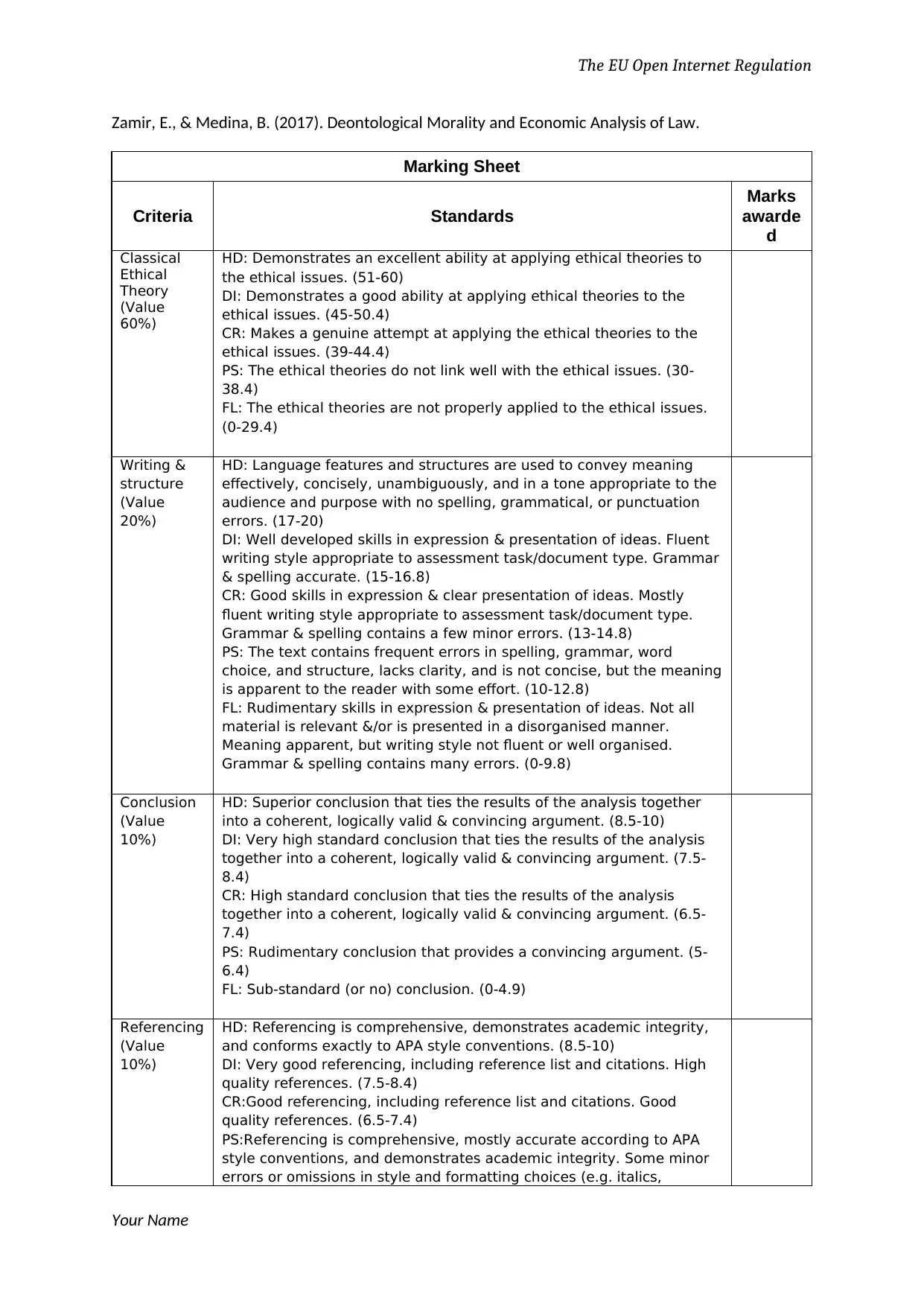
The EU Open Internet Regulation
Zamir, E., & Medina, B. (2017). Deontological Morality and Economic Analysis of Law.
Marking Sheet
Criteria Standards
Marks
awarde
d
Classical
Ethical
Theory
(Value
60%)
HD: Demonstrates an excellent ability at applying ethical theories to
the ethical issues. (51-60)
DI: Demonstrates a good ability at applying ethical theories to the
ethical issues. (45-50.4)
CR: Makes a genuine attempt at applying the ethical theories to the
ethical issues. (39-44.4)
PS: The ethical theories do not link well with the ethical issues. (30-
38.4)
FL: The ethical theories are not properly applied to the ethical issues.
(0-29.4)
Writing &
structure
(Value
20%)
HD: Language features and structures are used to convey meaning
effectively, concisely, unambiguously, and in a tone appropriate to the
audience and purpose with no spelling, grammatical, or punctuation
errors. (17-20)
DI: Well developed skills in expression & presentation of ideas. Fluent
writing style appropriate to assessment task/document type. Grammar
& spelling accurate. (15-16.8)
CR: Good skills in expression & clear presentation of ideas. Mostly
fluent writing style appropriate to assessment task/document type.
Grammar & spelling contains a few minor errors. (13-14.8)
PS: The text contains frequent errors in spelling, grammar, word
choice, and structure, lacks clarity, and is not concise, but the meaning
is apparent to the reader with some effort. (10-12.8)
FL: Rudimentary skills in expression & presentation of ideas. Not all
material is relevant &/or is presented in a disorganised manner.
Meaning apparent, but writing style not fluent or well organised.
Grammar & spelling contains many errors. (0-9.8)
Conclusion
(Value
10%)
HD: Superior conclusion that ties the results of the analysis together
into a coherent, logically valid & convincing argument. (8.5-10)
DI: Very high standard conclusion that ties the results of the analysis
together into a coherent, logically valid & convincing argument. (7.5-
8.4)
CR: High standard conclusion that ties the results of the analysis
together into a coherent, logically valid & convincing argument. (6.5-
7.4)
PS: Rudimentary conclusion that provides a convincing argument. (5-
6.4)
FL: Sub-standard (or no) conclusion. (0-4.9)
Referencing
(Value
10%)
HD: Referencing is comprehensive, demonstrates academic integrity,
and conforms exactly to APA style conventions. (8.5-10)
DI: Very good referencing, including reference list and citations. High
quality references. (7.5-8.4)
CR:Good referencing, including reference list and citations. Good
quality references. (6.5-7.4)
PS:Referencing is comprehensive, mostly accurate according to APA
style conventions, and demonstrates academic integrity. Some minor
errors or omissions in style and formatting choices (e.g. italics,
Your Name
Zamir, E., & Medina, B. (2017). Deontological Morality and Economic Analysis of Law.
Marking Sheet
Criteria Standards
Marks
awarde
d
Classical
Ethical
Theory
(Value
60%)
HD: Demonstrates an excellent ability at applying ethical theories to
the ethical issues. (51-60)
DI: Demonstrates a good ability at applying ethical theories to the
ethical issues. (45-50.4)
CR: Makes a genuine attempt at applying the ethical theories to the
ethical issues. (39-44.4)
PS: The ethical theories do not link well with the ethical issues. (30-
38.4)
FL: The ethical theories are not properly applied to the ethical issues.
(0-29.4)
Writing &
structure
(Value
20%)
HD: Language features and structures are used to convey meaning
effectively, concisely, unambiguously, and in a tone appropriate to the
audience and purpose with no spelling, grammatical, or punctuation
errors. (17-20)
DI: Well developed skills in expression & presentation of ideas. Fluent
writing style appropriate to assessment task/document type. Grammar
& spelling accurate. (15-16.8)
CR: Good skills in expression & clear presentation of ideas. Mostly
fluent writing style appropriate to assessment task/document type.
Grammar & spelling contains a few minor errors. (13-14.8)
PS: The text contains frequent errors in spelling, grammar, word
choice, and structure, lacks clarity, and is not concise, but the meaning
is apparent to the reader with some effort. (10-12.8)
FL: Rudimentary skills in expression & presentation of ideas. Not all
material is relevant &/or is presented in a disorganised manner.
Meaning apparent, but writing style not fluent or well organised.
Grammar & spelling contains many errors. (0-9.8)
Conclusion
(Value
10%)
HD: Superior conclusion that ties the results of the analysis together
into a coherent, logically valid & convincing argument. (8.5-10)
DI: Very high standard conclusion that ties the results of the analysis
together into a coherent, logically valid & convincing argument. (7.5-
8.4)
CR: High standard conclusion that ties the results of the analysis
together into a coherent, logically valid & convincing argument. (6.5-
7.4)
PS: Rudimentary conclusion that provides a convincing argument. (5-
6.4)
FL: Sub-standard (or no) conclusion. (0-4.9)
Referencing
(Value
10%)
HD: Referencing is comprehensive, demonstrates academic integrity,
and conforms exactly to APA style conventions. (8.5-10)
DI: Very good referencing, including reference list and citations. High
quality references. (7.5-8.4)
CR:Good referencing, including reference list and citations. Good
quality references. (6.5-7.4)
PS:Referencing is comprehensive, mostly accurate according to APA
style conventions, and demonstrates academic integrity. Some minor
errors or omissions in style and formatting choices (e.g. italics,
Your Name
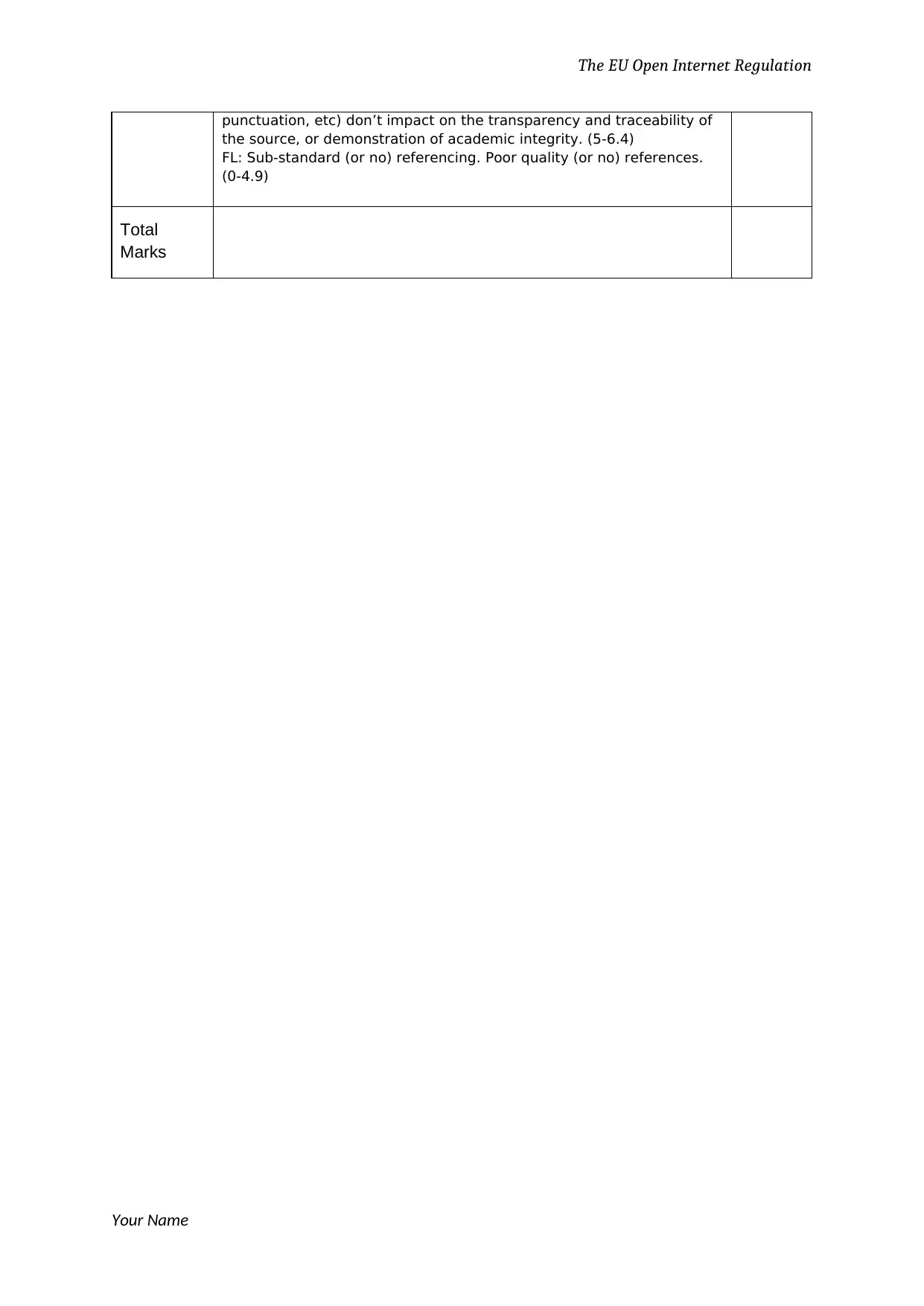
The EU Open Internet Regulation
punctuation, etc) don’t impact on the transparency and traceability of
the source, or demonstration of academic integrity. (5-6.4)
FL: Sub-standard (or no) referencing. Poor quality (or no) references.
(0-4.9)
Total
Marks
Your Name
punctuation, etc) don’t impact on the transparency and traceability of
the source, or demonstration of academic integrity. (5-6.4)
FL: Sub-standard (or no) referencing. Poor quality (or no) references.
(0-4.9)
Total
Marks
Your Name
⊘ This is a preview!⊘
Do you want full access?
Subscribe today to unlock all pages.

Trusted by 1+ million students worldwide
1 out of 6
Related Documents
Your All-in-One AI-Powered Toolkit for Academic Success.
+13062052269
info@desklib.com
Available 24*7 on WhatsApp / Email
![[object Object]](/_next/static/media/star-bottom.7253800d.svg)
Unlock your academic potential
Copyright © 2020–2026 A2Z Services. All Rights Reserved. Developed and managed by ZUCOL.





